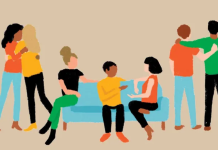There are plenty of posts popping up with logistical considerations on how to stay connected during isolation (including one from St. Louis Moms Blog!), but I wanted to back up and think about the question of friendship and isolation from a more philosophical perspective.
My daughter and I run a podcast together as one of her homeschool projects. It’s based on NBC’s series The Good Place, and we’re going through each episode and taking out the life lessons from the show (check us out! We’d love to have you listen!). One of the major themes that comes up in the show and our discussions is what it means to be a friend.

Those conversations seem particularly important right now as we all do our best to flatten the curve and abide by isolation recommendations in the face of a pandemic. What does friendship mean when we can’t get together? How do you keep connections alive in the face not only of restrictions but the anxiety and overwhelm that have many of us retreating into Netflix binges and emotional, as well as physical, solitude? How can we be good friends? How can we help our kids stay connected so that they don’t lose precious friendships while we wait for the light at the end of the tunnel?
In one of our podcast discussions (Episode 6), we talked about Aristotle’s definitions of friendship. The ancient philosopher said there were three kinds of friends: friends of utility, friends of pleasure, and friends of virtue.
The first two types are somewhat superficial, but they’re still important. A friendship of utility is one based on how useful people are to one another. These are the people who carpool with you, the ones who help you study for a big math test, the friendly neighbor who shovels your sidewalk when it snows. You might not always be super close, but you’re there for one another when you can lend a hand.

A friendship of pleasure is found in the friends who are there for a great time. They’re the neighborhood kids that you can always count on for an impromptu game of tag, the friend that’s happy to grab a beer, the people you meet up with to go bowling or catch a baseball game.
These friendships are going to have a hard time in isolation. They’re often based around interactions, and when those interactions aren’t there, the friendship itself is going to struggle to find its footing. This is true for adults and kids alike.
But the opportunity is there for (some of) these casual friendships to blossom into Aristotle’s third kind of friendship: virtue friendships.
Virtue friendships aren’t superficial. They’re deep. They’re the friends you come to when you really need to talk. These are the people whose advice you’re willing to take and who you aren’t afraid to share your opinion with when you think they’re making a mistake. You help make one another better, and you weather many storms—including weeks or months without contact.
Not every friendship is going to make it through this period of isolation, and that’s okay. Many of them will pick back up when the opportunities to reconnect in person are back. Some of them won’t.
But as we think about what friendship looks like in the meantime, we need to explore the potential for deeper connections and accept quality over quantity. We likely won’t be able to recreate the conditions needed for all of our friendships, but we can find the friendships we need most.

My daughter and I have spent a lot of time thinking about what lets us build virtue friendships, and we think all of the conditions can still be met without physical contact. Here’s what we came up with:
- You need time to talk. Online games and virtual classes are great, but virtue friendships flourish when people get to connect one-on-one in real conversation. A good old-fashioned phone call or a fancy app filled with silly stickers and selfie filters: it doesn’t matter. Just talk. Often and regularly.
- You need to explore in-depth topics. Once you’ve gotten through the silly and superficial topics, dig deeper. Read the same book or watch the same movie and talk about it. Get to know how you each think and care and approach the world. Find your similarities and differences. These are both key to your deepest friendship.
- You need other friends. You don’t need dozens of friends, but it is important to have more than one. It’s unfair to place the pressure of friendship so fully on one person, so work to build a few meaningful friendships so that you have a network of support.
- Be the friend you need. Friendship is a back-and-forth relationship. Make sure that you’re offering the kind of support that you need others to offer you. Make yourself available for those chats and games. Reach out when you haven’t heard from someone in a while.
This is a challenging time, and we’re all adjusting to what seems like new (bad) news every day. Friends are a crucial part of coping, and it’s worth it to make sure you keep those connections going.










